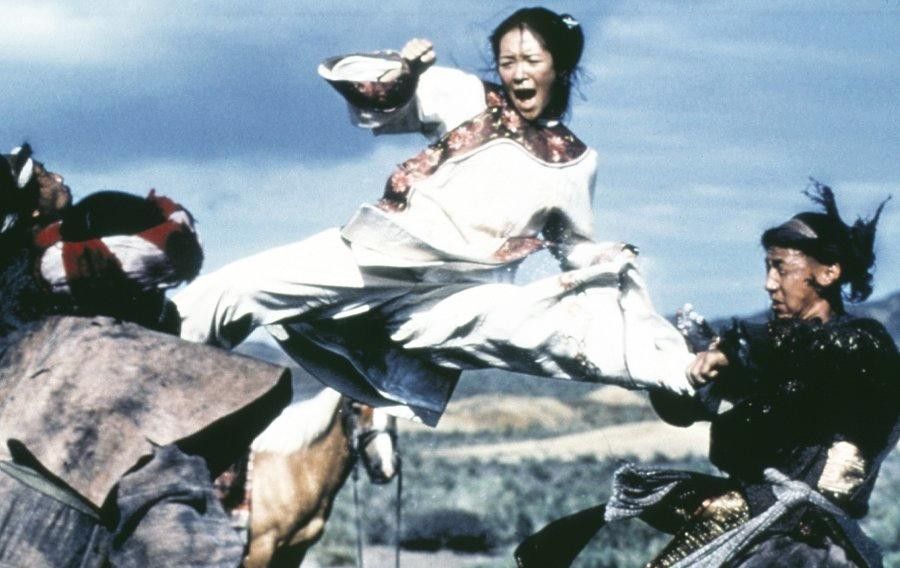★★★½
“Rated Arrrrrrr…”
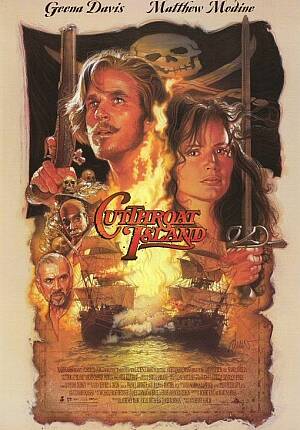 It seems to me that Cutthroat Island was largely just ahead of its time. Made in 1995, it shares a lot of the same elements as the wildly-successful Pirates of the Caribbean, which also had two gangs of pirates, feuding over treasure, while the British navy runs interference. Hell, there’s even an annoying pet monkey in both movies. But Cutthroat was such a big disaster at the box-office, it sat in the Guinness Book of Records, until subsequently passed by the likes of Gigli, and helped bankrupt Carolco.
It seems to me that Cutthroat Island was largely just ahead of its time. Made in 1995, it shares a lot of the same elements as the wildly-successful Pirates of the Caribbean, which also had two gangs of pirates, feuding over treasure, while the British navy runs interference. Hell, there’s even an annoying pet monkey in both movies. But Cutthroat was such a big disaster at the box-office, it sat in the Guinness Book of Records, until subsequently passed by the likes of Gigli, and helped bankrupt Carolco.
Certainly, with an estimated $92m budget and a US gross of only $10m, it was a disaster movie, in the most literal sense of the word. But, truth be told, it’s not that bad: in the IMDB it rates a 5.4, which is respectable enough, and there’s no denying that, unlike many such films, the money is actually obvious on the screen. For this was made in the days before large-scale CGI, when the only way to have pirate ships battling on the high seas was…well, actually to have pirate ships battling on the high seas. Malta and Thailand stood in for the Atlantic, Davis mostly does her own stunts, and the finale features one of the best explosions captured on celluloid.
The plot is patterned after classic Errol Flynn films like The Sea Hawk, with Davis in the Flynn role as Morgan Adams, who inherits a ship after her father is killed by her evil uncle, Dawg (Langella). She also has part of a treasure-map – Dawg has another chunk, with the final portion owned by a third brother. The film is largely concerned by the various parties trying to acquire all the parts of the map, race to the treasure, avoid the British navy, and escape with the loot. There’s also a romantic subplot involving career thief William Shaw (Modine), needed to translate the map, but he and Morgan don’t have much chemistry. That’s perhaps because Davis was, at the time, married to director Harlin, and it’s certainly notable that every other woman in the film looks like she’s been keel-hauled beside the impeccably-styled Davis.
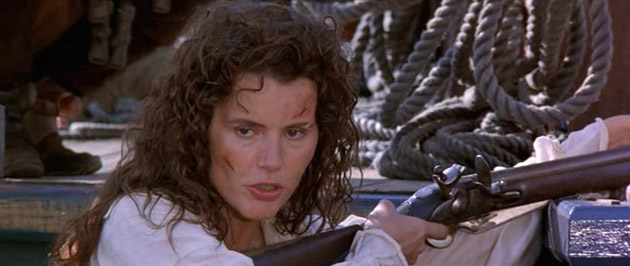 [The plan at first was to have Michael Douglas as the male lead – at a price of $15m – but he supposedly withdrew when his role was shrunk to make Davis the lead. Keanu Reeves and Tom Cruise got the same offer, but declined. The producers then worked their way down the food chain, through Daniel Day Lewis, Jeff Bridges, Michael Keaton, Charlie Sheen, Liam Neeson and Tim Robbins, before getting Modine for $4m. It’s interesting to speculate about how the film might have ended up with any of the other names – I mean, Charlie Sheen in a pirate film? On the other hand, a lot of people thought Johnny Depp, and letting him channel Keith Richards, was a bad idea…]
[The plan at first was to have Michael Douglas as the male lead – at a price of $15m – but he supposedly withdrew when his role was shrunk to make Davis the lead. Keanu Reeves and Tom Cruise got the same offer, but declined. The producers then worked their way down the food chain, through Daniel Day Lewis, Jeff Bridges, Michael Keaton, Charlie Sheen, Liam Neeson and Tim Robbins, before getting Modine for $4m. It’s interesting to speculate about how the film might have ended up with any of the other names – I mean, Charlie Sheen in a pirate film? On the other hand, a lot of people thought Johnny Depp, and letting him channel Keith Richards, was a bad idea…]
What the movie lacks in love interest, it more than makes up for in action – particularly, things going BOOM. This was set in an era when men were men, but women were men too, and everything was apparently likely to explode in a monstrous fireball at a moment’s notice. The opening sequence sees Morgan being recognised as a pirate, and chased by the British through Port Au Prince, a sequence which contains enough action for the climax of most films, not least when the navy decides to open fire from off-shore. The highlight has Davis rolling out a window, off a roof and onto a moving carriage, a serious “How the hell did they do that?” moment [the answer is, it’s a composite shot, joining one of her falling from the roof, to one of her pretending to have landed on the coach].
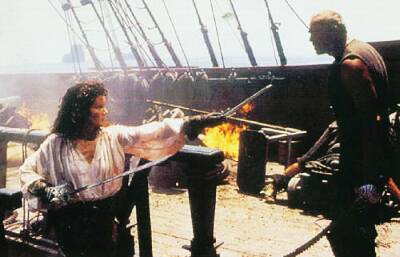 You will probably spend much of the film wondering how the film is going to top that, not least because the middle-part of the movie is not exactly enthralling. I mean, we know everyone is going to Cutthroat Island, so could they possibly hurry up and get there already? I’m also unimpressed by Chaykin as a journalist, embedded with Morgan, who is supposed to be writing up the activities of the pirates for his publisher. Not sure quite what his purpose was, and in a film that already runs over two hours, reckon he could have been removed without issue. It would also be fair to say that the plot, in general, is no more than a string of cliches, and the characters are similarly over-familiar, a disappointment given the transgressive concept at the film’s heart.
You will probably spend much of the film wondering how the film is going to top that, not least because the middle-part of the movie is not exactly enthralling. I mean, we know everyone is going to Cutthroat Island, so could they possibly hurry up and get there already? I’m also unimpressed by Chaykin as a journalist, embedded with Morgan, who is supposed to be writing up the activities of the pirates for his publisher. Not sure quite what his purpose was, and in a film that already runs over two hours, reckon he could have been removed without issue. It would also be fair to say that the plot, in general, is no more than a string of cliches, and the characters are similarly over-familiar, a disappointment given the transgressive concept at the film’s heart.
But it is a pirate movie and, to quote Roger Ebert, “is everything a movie named Cutthroat Island should be, and no more.” The final battle, where everyone collides in the middle of the ocean, is a great action set-piece, and Morgan duels her way with Dawg everywhere from the crow’s nest to the hold. Though I do feel his final dispatch (it hardly counts as a spoiler – I stress once more, this is a pirate movie) is, again, a slight shame, with the heroine forced to pull out the, ah, big guns to deal with him, rather than using her own skill.
Still, an entertaining effort, which truly deserves to be seen on a big screen with a good sound-system, and is an interesting precursor to The Long Kiss Goodnight, made by Harlin and Davis shortly after, which also tanked. In light of the subsequent success of Caribbean (and its imminent sequels), the time seems right for a re-evaluation, and I note that most of the recent IMDB comments have been warmly enthusiastic towards the movie. While the chances for the obvious sequel likely evaporated with the couple’s messy divorce – she filed in 1997, the month his personal assistant gave birth to his son – it certainly deserves to be freed from Davy Jones’ Locker of Hollywood Failure.
Dir: Renny Harlin
Star: Geena Davis, Matthew Modine, Frank Langella, Maury Chaykin
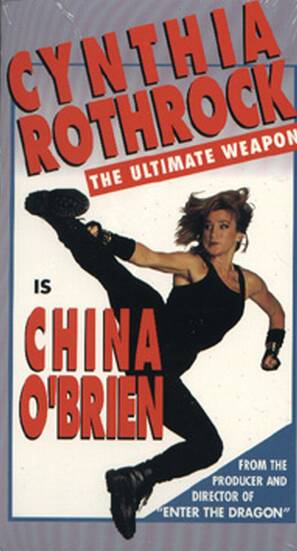 There’s something charmingly naive about this film. It inhabits, and expects us to believe in, a world where a villain can blow up the sheriff and his deputy with car-bombs, yet federal authorities take no interest. Nor do they apparently care when an election rally is machine-gunned. Mind you, in this same world, a new sheriff is elected five working days after the incumbent dies, but that’s still enough time for a massive parade down main street to be organised by a candidate.
There’s something charmingly naive about this film. It inhabits, and expects us to believe in, a world where a villain can blow up the sheriff and his deputy with car-bombs, yet federal authorities take no interest. Nor do they apparently care when an election rally is machine-gunned. Mind you, in this same world, a new sheriff is elected five working days after the incumbent dies, but that’s still enough time for a massive parade down main street to be organised by a candidate.




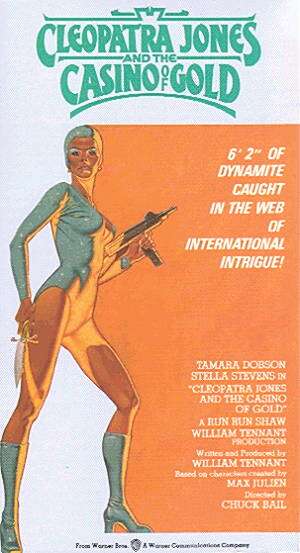 In the 70’s, Shaw Brothers hooked up with Western studios, to various effect, e.g. the inept Dracula and the Seven Golden Vampires, made in conjunction with Hammer. Co-production works rather better here, lending genuine exotic locations, and an endless array of stuntmen, prepared to hurl themselves off things. Jones heads to HK after a couple of her minions are captured by the evil, lesbian, sword-wielding Dragon Lady (Stevens), intent on bringing down the operation, with a little local assistance.
In the 70’s, Shaw Brothers hooked up with Western studios, to various effect, e.g. the inept Dracula and the Seven Golden Vampires, made in conjunction with Hammer. Co-production works rather better here, lending genuine exotic locations, and an endless array of stuntmen, prepared to hurl themselves off things. Jones heads to HK after a couple of her minions are captured by the evil, lesbian, sword-wielding Dragon Lady (Stevens), intent on bringing down the operation, with a little local assistance. Though I hope 80’s hair
Though I hope 80’s hair 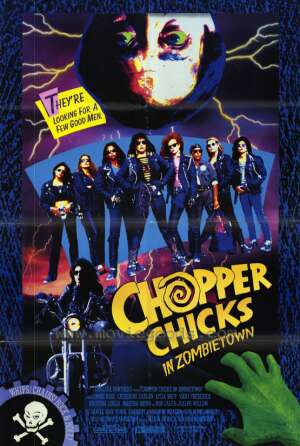 The Cycle Sluts motorcycle gang roar into town, to the consternation and distaste of locals, who drive them off. This decision is regretted soon afterwards, when they come under siege from the walking dead, raised to work in the local mine – a plot stolen from Hammer’s Plague of the Zombies – by the local mortician (Calfa) and his midget assistant. Luckily, the girls are still near, and can assist the townsfolk, including Billy Bob Thornton, who plays a redneck hick, proving it’s possible to be stereotyped
The Cycle Sluts motorcycle gang roar into town, to the consternation and distaste of locals, who drive them off. This decision is regretted soon afterwards, when they come under siege from the walking dead, raised to work in the local mine – a plot stolen from Hammer’s Plague of the Zombies – by the local mortician (Calfa) and his midget assistant. Luckily, the girls are still near, and can assist the townsfolk, including Billy Bob Thornton, who plays a redneck hick, proving it’s possible to be stereotyped 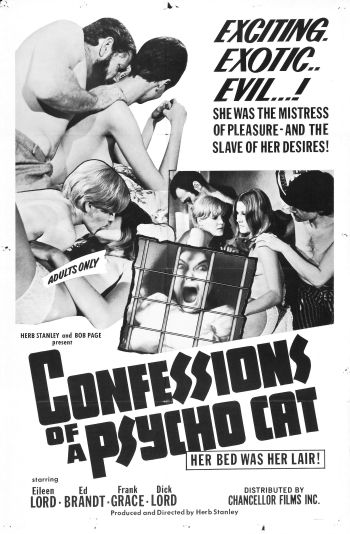
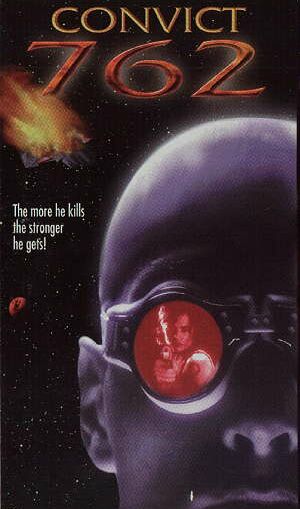 A good idea – even if one borrowed about equally from Pitch Black and Aliens – gets sucked into the void and drained of all life, thanks to some of the most turgid direction imaginable. A ship with an all-female crew has to land on a prison planet for fuel, but finds only two people left. Which is the mass murderer? Can they find out before they get picked off, one by one…?
A good idea – even if one borrowed about equally from Pitch Black and Aliens – gets sucked into the void and drained of all life, thanks to some of the most turgid direction imaginable. A ship with an all-female crew has to land on a prison planet for fuel, but finds only two people left. Which is the mass murderer? Can they find out before they get picked off, one by one…?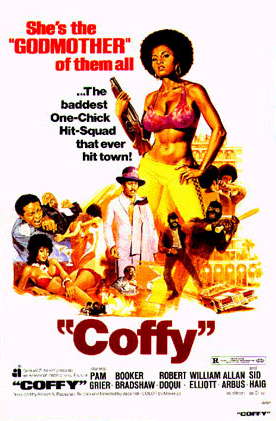 Neither star Grier nor director Hill were exactly strangers to the world of exploitation when they made this, but their combination here created a whole new subgenre, crossing action heroineism with black cinema. Following her would come Foxy Brown, Cleopatra Jones and the rest, but let it be said, Coffy was the first of any significance.
Neither star Grier nor director Hill were exactly strangers to the world of exploitation when they made this, but their combination here created a whole new subgenre, crossing action heroineism with black cinema. Following her would come Foxy Brown, Cleopatra Jones and the rest, but let it be said, Coffy was the first of any significance.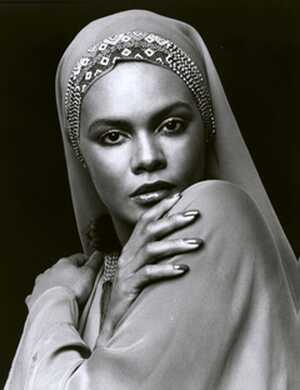 The success of independent blaxploitation films inevitably let to the major studios trying to cash in, and this applied to both sexes. Jones was their response, with 6’2″ Tamara Dobson over-filling Pam Grier’s shoes, as the special agent taking on dyke drug queen Mama (Winters, chewing scenery atrociously) and police corruption, at home and abroad (“Turkey”, supposedly – I wasn’t convinced).
The success of independent blaxploitation films inevitably let to the major studios trying to cash in, and this applied to both sexes. Jones was their response, with 6’2″ Tamara Dobson over-filling Pam Grier’s shoes, as the special agent taking on dyke drug queen Mama (Winters, chewing scenery atrociously) and police corruption, at home and abroad (“Turkey”, supposedly – I wasn’t convinced). It seems to me that Cutthroat Island was largely just ahead of its time. Made in 1995, it shares a lot of the same elements as the wildly-successful Pirates of the Caribbean, which also had two gangs of pirates, feuding over treasure, while the British navy runs interference. Hell, there’s even an annoying pet monkey in both movies. But Cutthroat was such a big disaster at the box-office, it sat in the Guinness Book of Records, until subsequently passed by the likes of Gigli, and helped bankrupt Carolco.
It seems to me that Cutthroat Island was largely just ahead of its time. Made in 1995, it shares a lot of the same elements as the wildly-successful Pirates of the Caribbean, which also had two gangs of pirates, feuding over treasure, while the British navy runs interference. Hell, there’s even an annoying pet monkey in both movies. But Cutthroat was such a big disaster at the box-office, it sat in the Guinness Book of Records, until subsequently passed by the likes of Gigli, and helped bankrupt Carolco.
 You will probably spend much of the film wondering how the film is going to top that, not least because the middle-part of the movie is not exactly enthralling. I mean, we
You will probably spend much of the film wondering how the film is going to top that, not least because the middle-part of the movie is not exactly enthralling. I mean, we 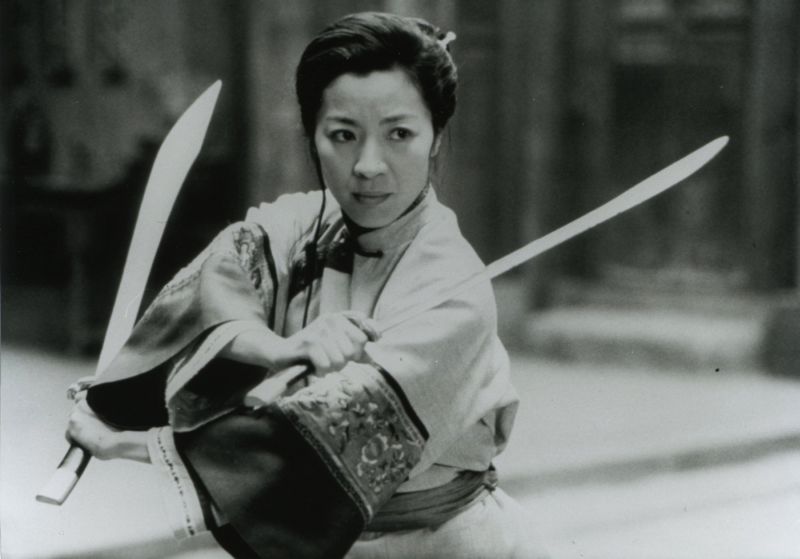
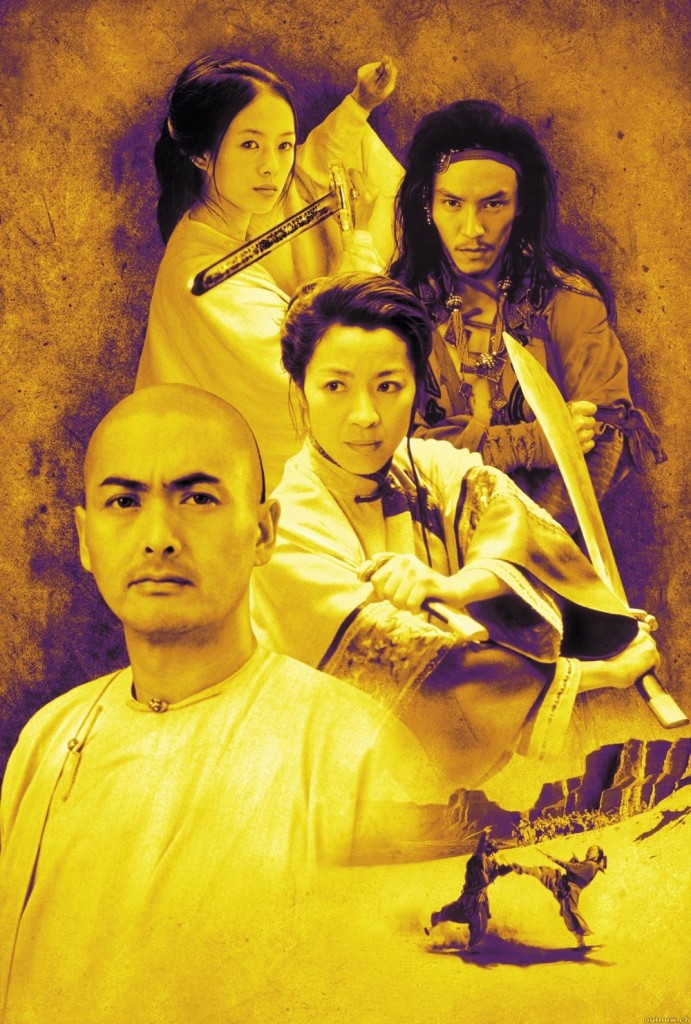
 Not many subtitled movies can claim to have inspired commercials (Jean de Florette being the only other that comes to mind), but seeing the
Not many subtitled movies can claim to have inspired commercials (Jean de Florette being the only other that comes to mind), but seeing the 